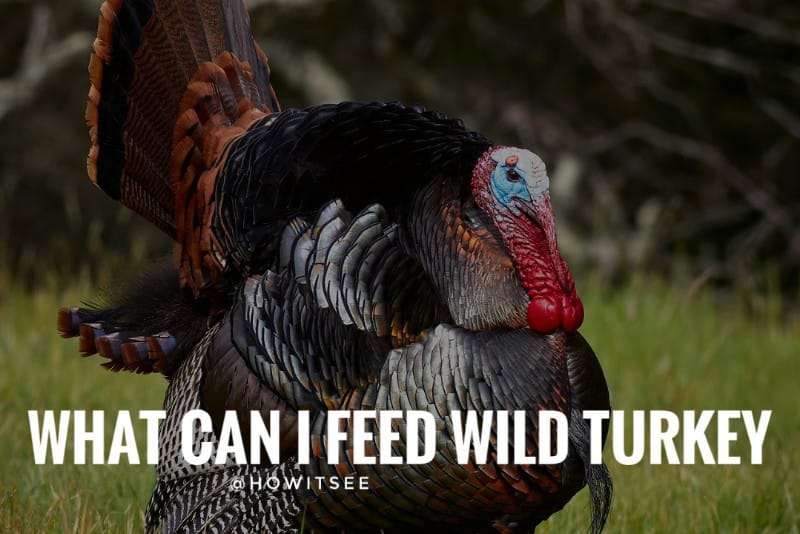Turkeys make one of the most delicate game birds, and their hunting has witnessed skyrocketing popularity, especially in the United States and Canada. New emerging hunters have several questions regarding the turkey bird, its behavior, vision, foraging habits, etc. With the turkey hunting season around the corner, many questions revolve around these fascinating birds. Therefore today, we bring to you our today’s article addressing the question, What can I Feed a Wild Turkey in Different Seasons?
To answer the question, wild turkeys eat a broad spectrum of foods and are not picky at all. Turkeys are highly opportunistic feeders and will nib on anything they walk past. They can be fed wheat, oats, sunflower seeds, nuts, corns, grasses, leafy vegetables, etc. Even any regular chicken or poultry feeds will perfectly do the job.
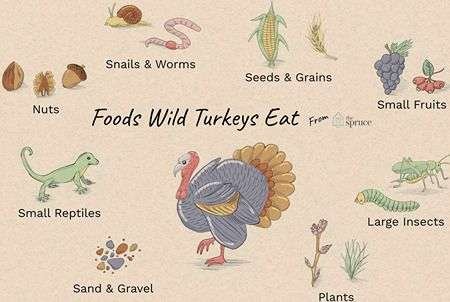
Image Source | theSpruce
Best Food Items to Feed Wild Turkeys
1) Seeds and Grains: Grains and seeds like millets, wheat, oats, etc., are a vital source of proteins, vitamins, and minerals for Turkeys and also one of the most preferred foods by them. Sprinkling them around can attract a lot of hens and Toms. These grains and seeds can easily be purchased from any local store or Home Depot. Even the regular poultry feed will fit the job perfectly.
2) Cracked corns: Stuffed with proteins and fiber, cracked corns make excellent wild turkey feed. These are corns broken into pieces, and one can easily avail them from any local store.
3) Acorns: In the harsh winter months, Acorns serve to be the primary food for Turkeys, and they seem to love it. Acorns have a significant role in the digestive health of Turkeys and also act as a good protein source. Acorns are generally found in the wild, where there are plenty of acorn trees.
4) Nuts: Due to their high nutritional values, Nuts make an excellent food source for Turkeys. Hickory nuts, Walnuts, and beechnuts are high in proteins and vitamins and hence constitute a large part of a wild turkey’s diet.
5) Kitchen scraps: Even kitchen scraps likevegetable peels and seeds are a great food source if you want to feed Wild Turkeys.
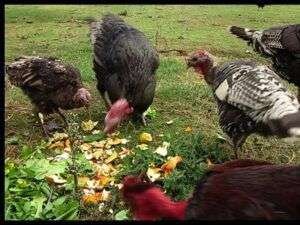
What do Wild Turkeys eat in the Winter?
Winters witness a shortage of food in almost all ecosystems of the planet. Turkeys, throughout the year, develop fats in their bodies to use up during the cold winter months. Wild turkeys need to locate enough food during the day and safe roosts at night to survive the winter, which is their most perilous season.
With daybreak, each flock of wild turkeys glides down from its nighttime resting place, away from the reach of predators and protected from wind, snow, and ice, and starts its daily hunt for food. Mature toms, who stuck to each other during the chilly winters, now separate from each other with the onset of the breeding season.
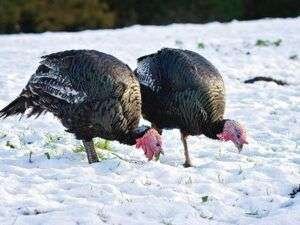
Turkeys may discover a variety of food on the ground, including acorns, nuts, and seeds, by scrounging through the snow. Sometimes, berries or some nutritious buds may remain frozen. Turkeys may climb these small bushes and shrubs to get a hold of these foods.
Nuts like hazelnuts, crabapples, frozen fruits and vegetation, small invertebrates, and acorns constitute a major portion of their winter diet. They can even survive on mosses, lichens, white pine, hemlock buds and needles, some ferns, sugar maple stems, etc. Acorns serve to be the most crucial food, filled with nutrients that are essential for survival during the harsh winter times.
What do Wild Turkeys eat in Spring?
Spring resumes life around after the freezing winters. New blades of grasses emerge, buds reappear on plants, and the general courses of nature resume all over again.
Plants blossom again, and many animals and invertebrates come out of their winter sleep as if nature has pressed its resume button. Therefore, the diet of Turkeys undergoes a plant-based one during the spring months.
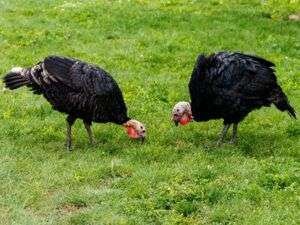
Image Source | Freepik
Turkeys consume more new buds, grasses, and other plant material in the spring. In general, grasses are crucial to turkeys because they offer succulent, year-round green foliage. This is particularly true in the initial spring days when greening hasn’t begun yet, and there are no alternative food sources available.
Turkeys eat both the tender green shoots and grass seeds as food. The native grass cover offers spring turkeys a readily available food source as well as excellent cover from predators.
A few native grass species include buffalo grass, bluestem, needlegrass, and blue gamma grass. These grasses are a habitat for a wide variety of invertebrates and bugs and therefore provide excellent feeding grounds for the young turkeys to bug around.
What do Wild Turkeys eat in Summer?
After the critical winter months comes summer. With the budding nature around, food sources are plentiful. Since grasses mature during the summer months, they become less appetizing to the Turkeys. Therefore, their diet shifts to an insectivorous one.
The summer months also serve as breeding and mating months for turkeys, and therefore they need to consume more food. Chicks grow during these months, requiring high energy levels and enough protein in their diet to ensure the juvenile birds’ overall growth and development.
Newly hatched poults primarily consume insects and other invertebrates in the initial stages of their life. Turkeys are opportunistic feeders and will poke at anything that will walk past their heads.
In the summer, there are plenty of fruits, plants, and insects, and turkeys eat whatever is available in abundance. This includes tiny vertebrates like lizards, grasshoppers, dragonflies, caterpillars, salamanders as well as snails, and in some cases, crayfish.
What should you not feed Turkeys?
In the last segment of our article on, What can I Feed a Wild Turkey, we are going to talk about some foods that you should refrain from feeding to Turkeys. Those are as follows:
- Onions
- Avocados
- Leaves and stems of nightshade plants like tomato, potato, etc.
- Dairy foods
- Regular processed foods
Here, we conclude our article on “What to feed a Wild Turkey.” We will be returning soon with another such informative article, so stay tuned until then.
Also Read:

Meet Monty, the visionary founder of How It See, being an engineering student, he’s fueled by an insatiable curiosity about the world around him. He is captivated by an eclectic correlation between animal groups, science, and nature, and this fascination drives his quest for understanding.
After completing his degree, he’s set on a mission to delve deep into the realm of nature, accumulating knowledge to share with you through his writing. In the meantime, he loves to watch anime and read anime.
